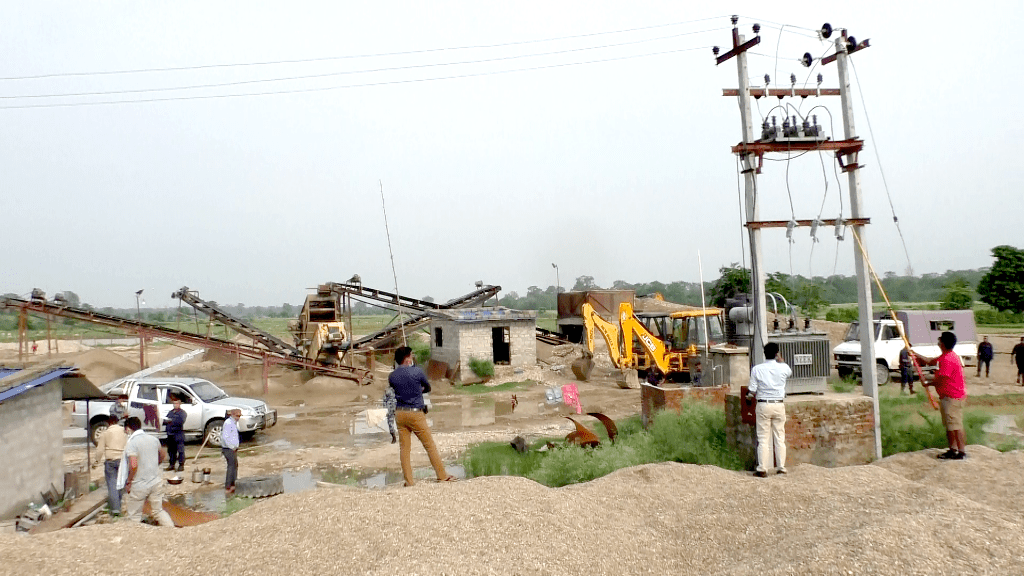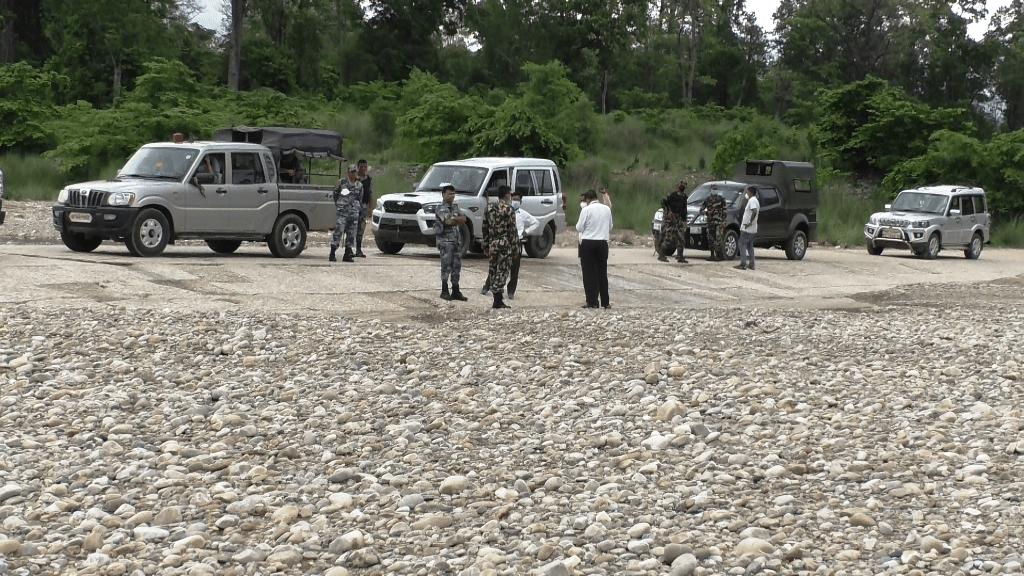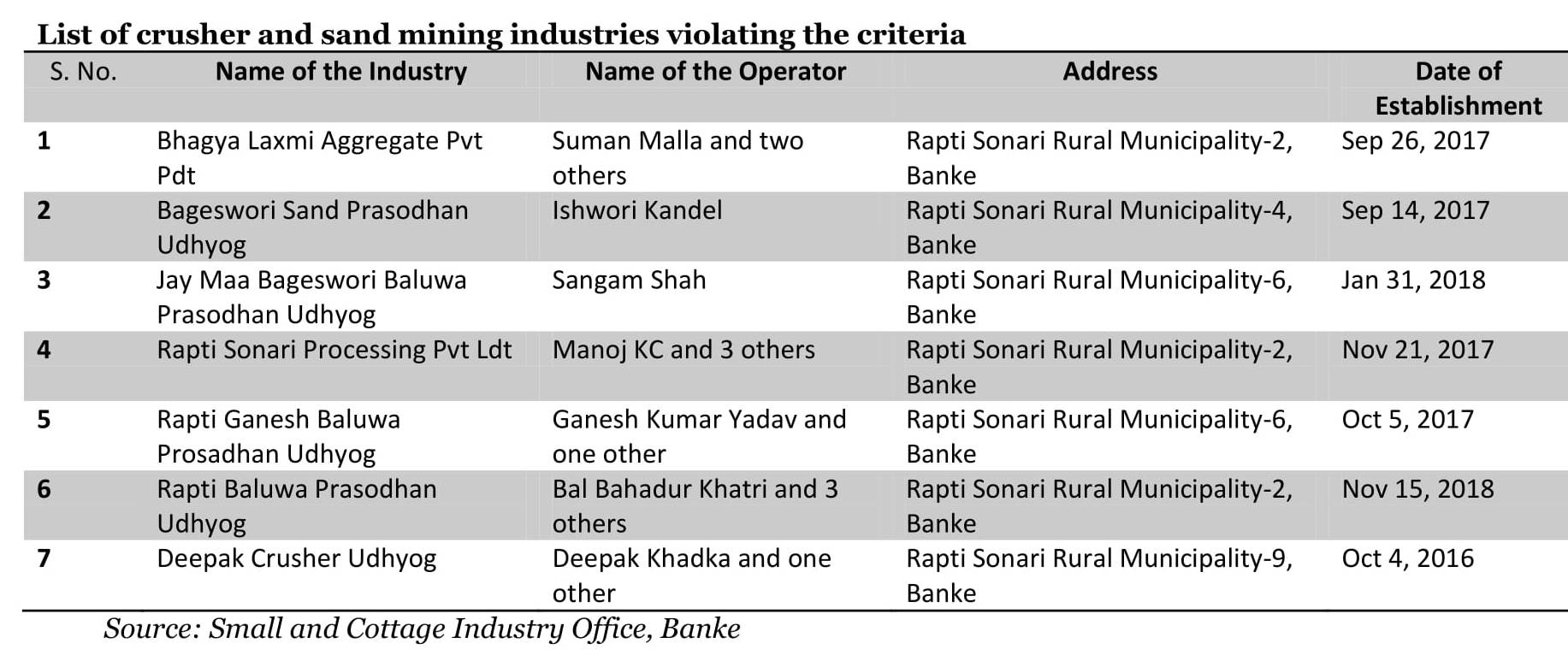Uncontrolled, and mostly illegal extraction, of sand and gravels from riverbeds is killing rivers of Rapti Sonari Rural Municipality because of its failed efforts in awarding contracts for three times.
Krishna Adhikari: Centre for Investigative Journalism-Nepal
In an effort to manage the natural resources in the area, the Rapti Sonari Rural Municipality of Banke constituted a Natural Resources Management Committee led by Khum Bahadur Basnet, chairman of ward-8 in August 2018.

NEA officials disconnect electricity connection to an illegally operated crusher factory in Banke’s Rapti Sonari Rural Municipality as security and DAO officers look on. Photos:Krishna Adhikari
The rural municipality, however, did not consider it worth consulting with the Committee while awarding contracts for the extraction of sand, gravel, aggregate and other river-borne materials from the rivers. In fact, it was done without the knowledge and consent of the Basnet-led committee. Basnet knew about the contract only when the rural municipality issued a notice on August 27, 2019.
Article 6 (Sub-Article 2) of the Riverine Material Management Procedure 2018 issued by the Province-5 government requires separate calls for bids in a package to extract riverbed materials from local rivers.
However, the rural municipality invited all four contractors to extract sand and gravel from rivers, including Muguwa, Khairi, Jhijari and Rapti in a single package. Small-scale contractors, however, did not compete in the bid arguing that the amount would be too high to handle the contract in a single package deal. Says ward chairperson Basnet, “People’s representatives and their coterie played foul in the entire contract process.”
The extraction and collection of the riverbed materials are usually carried out between mid-September to mid-June every year. The working procedure of the Province-5 government prohibits extraction, collection and hoarding of riverbed materials from July to mid-September. If the provision is to be followed, the rural municipality has to initiate the process of supplying the materials by giving away contracts in the month of Sep-October every fiscal year. The Rapti Sonari Rural Municipality had issued a 3-day notice on August 27, 2019, as per the provision.
If the record of the rural municipality’s tender evaluation committee is to be considered, the Dhruba Tara Construction Sewa had bid for the contract at Rs 123.7 million.
Likewise, Amrit Construction Kohalpur and Shashi Construction Nepalgunj, too, had bid for the contract at Rs 70 million and Rs 90 million respectively. Likewise, Kaligandaki & Suppliers Mahadevpuri had contested at Rs 59.1 million.
Says an entrepreneur, “The rural municipality leaked the information that there was a huge gap of around Rs 60 million between the first two contracting companies. In fact, the rural municipality started to play foul since then.”

The CDO along with security forces and a local representative monitoring the Khairi Khola in Banke’s Rapti Sonari Municipality.
The Dhruba Nirman Sewa (Dhruba Construction Service) deposited a cheque of Rs 6.5 million at the Shunshergunj-based Himalaya Bank as a deposit of 5 percent of the total contract amount as surety along with an application. However, taking advantage of the leakage of information from the rural municipality, Dhruba Construction took out the money from the bank before it was deposited, hence, there was not enough deposit in rural municipality’s account on September 27, 2019, i.e. the day the tender was to be opened.
When the Dhruba Construction Service got out of the bidding as it failed to deposit the required earnest money, the tender evaluation committee of the rural municipality got further confused.
They were in a dilemma because both Amrit Construction and Shashi Construction, the companies in the second position in the bidding, had proposed an equal amount in the bidding. According to an entrepreneur who had taken part in the tender process, while the tender process was still going on, the representatives of Amrit and Shashi Constructions and the ward chairperson agreed to maintain at least Rs 60 million gap between the companies bidding for first and second position. They had agreed to share the 60 million between themselves.
However, efforts to share Rs 60 million by mid-October did not materialize. The Rapti Sonari Rural Municipality then sought the advice of its legal advisor Ganesh Tharu, and according to Tharu’s advice to re-issue a new tender, the rural municipality annulled the first tender on October 24, 2019. The rural municipality then issued a new tender on October 26, 2019, for the second time.
According to Lahuram Tharu, chairperson of the rural municipality, the Kaligandaki Construction & Suppliers Mahadevpuri bid the contract at Rs 60 million– the highest amount in the second tender.
The rural municipality officer bearers were taken aback with the huge gap in the amount in the first and the second tender. The rural municipality canceled the second tender on December 22, 2019, with the worry that the revenue collection would go down and that they would be alleged of irregularities in the tender process. The rural municipality then called the third tender on January 6, 2020. However, no company showed interest in the process this time.
As the rural municipality could not give away the contract for the extraction of sand and gravel, the crusher and tipper operators took advantage of the situation and started exploiting the riverbed materials by influencing local political parties, police and the rural municipality office bearers. Raising suspicion of anomalies, the Chief District Officer of Banke Ram Bahadur Kurumwang intervened into the matter on May 29, 2019.

Deepak Crusher Pvt. Ltd situated at the Mahadevpuri River in Rapti Sonari-9.
He then started to monitor the rivers by mobilizing the police in a bid to control the rampant illegal extraction of the riverbed materials. Says Kurumwang, “It has been found that the electricity consumption by the crusher industry was much higher in the year when no contracts were awarded. Moreover, the extraction of sand and gravels has increased significantly this year in comparison to previous years.”
In fact, quite a few peoples’ representatives of the Rapti Sonari Rural Municipality acknowledged their weaknesses in failing to control the rampant extraction of the riverbed products. “We acknowledge that despite our efforts, we failed to control the illegal extraction of the materials,” says Chairperson Lahuram Tharu, adding, “In fact, it is also due to the lack of coordination between the rural municipality and police administration.”
The rural municipality then decided to extract, collect and supply the river bed materials on its own in the third week of March 2020. It also decided to collect revenue following the rampant illegal extraction of the materials. Chairperson Tharu then mobilized 48 youth, acquainted with him, to extract, collect, and supply the riverbed materials for which he paid Rs 700 to one thousand to them as daily wage. However, the work got stalled after the enforcement of the nationwide lockdown on March 24.
The rivers flowing through Rapti Sonari Rural Municipality are the major sources of riverbed materials in Banke district. The extraction of such materials is carried out in rivers including Rapti, Muguwa, Jhijari, Hairi and Paruwa. According to Chairperson Tharu, the rural municipality collected total revenue of Rs 148.2 million through a contract from 38 thousand cubic feet rocks, gravel and sand from these rivers in fiscal year 2018/19.
However, the rural municipality has suffered a huge loss this year for failing to give away the contract. “We lost at least Rs 140 million in revenue from the riverbed materials,” said Tharu.
Meanwhile, during the course of monitoring, a team led by Chief District Officer of Banke, Ram Bahadur Kurumbang recovered more than one hundred thousand cubic meters of illegally extracted riverbed materials hidden in a nearby jungle in July 9, 2019. This, he said, is equivalent to 10 thousand tippers’ load.
With the increasing cases of illegal extraction of riverbed materials, a monitoring sub-committee led by Assistant CDO Dirgha Raj Upadhyaya has been constituted to control such activities.

After on-the-spot monitoring on June 25-28, the sub-committee submitted a report to the district-level monitoring committee in which it has presented the clear picture of rampant extraction of sand and gravel from the Rapti riverbed. It has also mentioned that the Sand Refinery and Crusher Industry has violated the Riverbed Materials Management Working Procedure 2075.
The report has further alleged the industries of trading the materials without tax bills and has failed to maintain the record of the buy and sale of the riverbed materials, lacking exact amount, and use of contaminated water while operating the industries. The sub-committee has recommended action against those violating the rules.
Meanwhile, the crusher industries have ignored the written instruction of the Small and Cottage Industry Office to abide by the procedure 2075 while operating their business. A meeting of the District Coordination Committee held under the chairmanship of coordinator Ajay Srivastav on June 29, 2019, had decided to take action against 23 crusher and sand processing industries for violating the guidelines as per the recommendation of the sub-committee. Six among them are from Rapti Sonari Rural Municipality.
According to the Small and Cottage Industry Office, Banke, among the 26 crusher and sand processing industries, only three have abided by the criteria while 10 have found to have breached it.
Likewise, 13 of them, despite being registered industries, are currently shut down at the moment, says Hukum Bahadur Wali, Officer at the Ghareku Tatha Sana Udhyog Office, Banke district. He says 10 crusher and sand processing industries have been closed from June 30, 2019.



